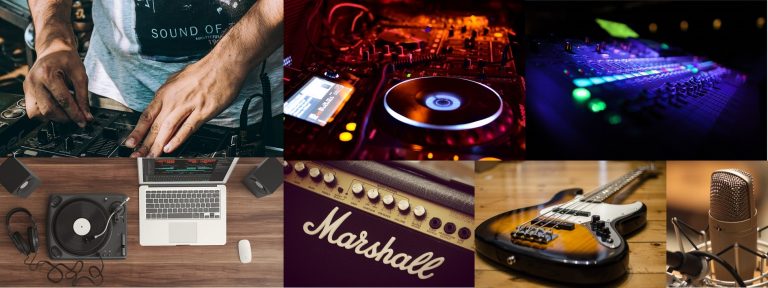
Music: An introduction to Electrical & Computer Engineering
Music has become an integral part of our daily life, but so few understand the engineering behind it. This course will give you an overview of Electrical and Computer Engineering (ECE), revolving around music. Several aspects of ECE will be covered, including the basics of acoustics and waves, the technology behind microphones, the electronic circuits behind amplifiers, analog to digital converters (ADCs) and digital to analog converters (DACs), sampling theory, signal processing using analog and digital filters, operation of speakers, encoding and compression techniques used in mp3, etc.
Music Laboratory: Hands on Learning
Have you ever wondered how a DJ machine works? What are all those knobs used on a mixer? How does a noise cancellation headphone work? In this hands-on course, students will learn about the technical details of different equipment used by recording artists and DJs, such as mixers, distortion units, bass pedals, synthesizers, and MIDI. Students will design and test a guitar amplifier as a hardware project and compose a soundtrack using a software synthesizer.
Broad Contents:
- Basics of acoustics, waves and resonance
- Electrical circuits and RLC networks
- Analog filters
- Opamps, amplifiers
- Fourier Series, Overtones and harmonics, ADSR
- Sensors and Actuators, operation of microphones and speakers
- Guitar Amplifiers
- Synthesis and MIDI
- Signal processing using analog and digital filters, equalizers
- Analog to Digital converters (ADCs)
- Digital to Analog converters (DACs)
- Sampling theory
- Operation of mixers, distortion units, bass pedals, synthesizers, and other effects
- Encoding and compression techniques
- Sound design
- Digital Audio Workstation (DAW)
Prerequisites:
- Introductory undergraduate courses in algebra, calculus and physics; basic ability to write computer code (Matlab)
Course Structure [2017S2, 2018S2]:
- ~3 hours of lecture per day (1:30-4:30pm @ tbd)
- ~3 hours of lab per day (9:00-12:00pm @ tbd)
- A major hardware project – broken down into smaller mini-projects.
- A major software project – broken down into smaller mini-projects.
Grading:
- In-class Quizzes 12%
- HW Lab Assignments 08%
- HW Project Demo 20%
- SW Project Demo 20%
- Final Exam 40%
Instructor’s Office Hour:
- Wednesdays 5:00-5:30pm K4017
- After Lectures
- By appointment